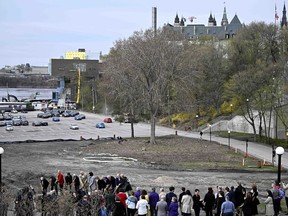To mark historic discrimination against the LGBTQ+ community at the hands of the federal government, as well as societal injustices against the community.

Article content
OTTAWA — After a rainy night in Ottawa, the sun broke through Wednesday afternoon ahead of a ceremony to break ground for a national LGBTQ+ monument.
That was no coincidence, Albert McLeod told a crowd gathered under a bridge near the Supreme Court of Canada and the Ottawa River, or the Kitchissippi, as it’s known to Algonquin Peoples.
Article content
“Those thunderers came last night and cleared the way for us to be here today — to celebrate being human, and to share that courage and strength,” said McLeod, a two-spirit elder and member of the monument’s design team.
Advertisement 2
Article content
The “Thunderhead” monument will mark historic discrimination against the LGBTQ+ community at the hands of the federal government, as well as societal injustices against the community.
In Anishinaabe teachings, thunderheads are clouds home to the thunderers, beings “whose storms renew the land and make things right,” according to the LGBT Purge Fund, which paid for the monument.
They hope the monument will do just the same when it opens in summer 2025.
The LGBT Purge refers to a period between the 1950s and mid-1990s when Canada systemically discriminated against thousands of LGBTQ members of the Canadian Armed Forces, the RCMP and the federal public service.
It formally ended in 1992 when Canada was initially taken to court, though survivors were compensated through a class action in 2018. The LGBT Purge Fund manages funds from the class-action lawsuit and is using $14 million to create the monument.
“It would have gone to victims of the LGBT Purge had they lived to make a claim in the class-action lawsuit,” said executive director Michelle Douglas.
“In this way, the monument is a gift to those who never received justice.”
Advertisement 3
Article content
The monument, steps in front of the Ottawa River, was designed by a Winnipeg-based team including Public City Architecture staffers Liz Wreford, Taylor LaRocque and Peter Sampson. It was also worked on by Shawna Dempsey and Lori Millan, both visual artists, and McLeod.
The site will be complete with a sacred fire site featuring 13 stones chosen by Indigenous members of the LGBTQ+ community in each province and territory. A column broken apart by a thunderhead cloud inside will also be included in the space, along with information about the LGBT Purge.
Canadian Heritage Minister Pascale St. Onge, a member of the LGBTQ community herself, was present to mark the occasion.
“The LGBT Purge was a shameful chapter in our history — many of you experienced it first-hand,” she told those gathered, many of whom were also from the community.
“You chose to serve your country and instead of thanks you got harassed, abused, interrogated and trauma … We feel the sorrow for you for what you had to go through and survive. And this monument that will stand here will remind us of this painful history.”
Speaking about a rise in homophobia and transphobia in recent years, St. Onge said the monument should remind Canadians about why it remains important to protect the rights and freedoms of everyone.
“There’s people that want to see those rights rolled back — there’s people that think we need to reverse all the progress toward equality and respect,” she said.
“We need to stand proud, and speak against that rise of intolerance and hatred.”
Article content



